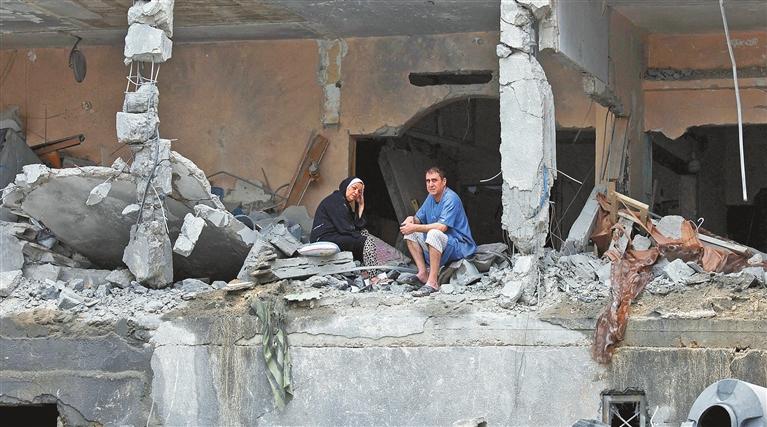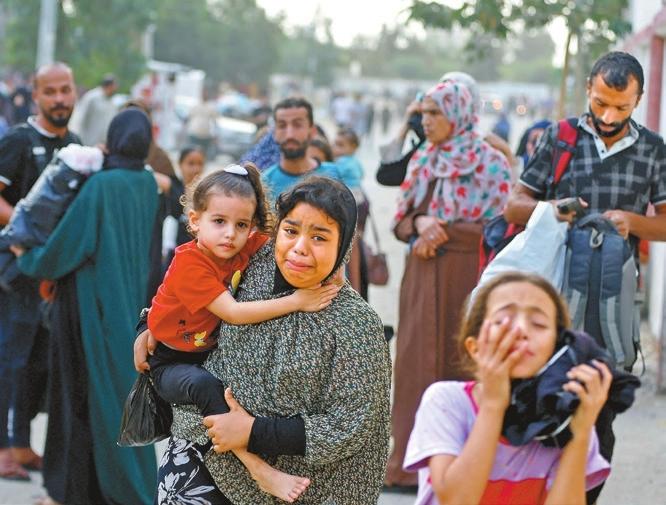

PALESTINIAN militant group Hamas, which dragged off about 150 people in its surprise weekend assault on Israel, threatened to execute the hostages if Israeli air strikes continue “targeting” Gaza residents without warning. The threat came after Israel on Monday imposed a total siege on the Gaza Strip, cutting off food, water and electricity supplies, and sparking fears of an increasingly dire humanitarian situation. Israel has been left reeling from Hamas’ unprecedented ground, air and sea attacks, likening them to 9/11. The death toll rose to 900 in Israel, which has retaliated with a withering barrage of strikes on Gaza, raising the death toll there to 687 as of Monday afternoon, according to AFP. Fireballs repeatedly lit up Gaza City on Monday night as explosions sounded and sirens wailed. Hamas — which the Israeli army estimates sent about 1,000 fighters across the border, spraying gunfire at civilians — said Monday that Israeli air strikes had killed four of the hostages. It later said it could start killing them itself. “Every targeting of our people without warning will be met with the execution of one of the civilian hostages,” the Ezzedine al-Qassam Brigades, the armed wing of Hamas, said in a statement. In a televised speech Monday night, Israeli Prime Minister Benjamin Netanyahu compared Hamas to the Islamic State group, also known as ISIS, and said Israel planned to carry out a “massive” assault against Hamas with “unprecedented force.” He also vowed to “strengthen other fronts in the north against Hezbollah,” where militants and Israeli forces exchanged fire for a second day. Hamas launched more rockets as far as Tel Aviv and Jerusalem, where missile defense systems fired and air raid sirens blared. Israel said it had called up 300,000 army reservists for its “Swords of Iron” campaign. Truck convoys moved tanks to the south, where its forces were working to dislodge holdout Hamas fighters. Defence Minister Yoav Gallant said Israel would impose a “complete siege” on the long-blockaded enclave of 2.3 million people: “No electricity, no food, no water, no gas — it’s all closed.” United Nations Secretary-General Antonio Guterres said he was “deeply distressed” by the siege announcement, and warned Gaza’s already dire humanitarian situation will now “only deteriorate exponentially.” Palestinians in the coastal territory braced for what many feared will be a massive Israeli ground attack aiming to defeat Hamas and liberate the hostages. Lebanon border clash Middle East tensions have spiked as Israel’s arch enemy Iran praised the Hamas attack, although Tehran rejected any direct role in the military operation. Hamas has called on “resistance fighters” in the West Bank and in Arab and Islamic nations to join what it has dubbed “Operation Al-Aqsa Flood.” “The military operation is still continuing,” said Hossam Badran, a Hamas official, adding that “there is currently no chance for negotiation on the issue of prisoners or anything else.” Israel has long prided itself on a high-tech military and intelligence edge in its many conflicts. But it has been shaken to the core by the Hamas strike, and now faces the threat of a multi-front war. On Monday, the Israeli army said its soldiers had “killed a number of armed suspects” who had crossed the border from Lebanon and that Israeli helicopters were striking targets in the area. The Palestinian militant group Islamic Jihad later claimed responsibility for the thwarted infiltration from Lebanon to Israel. Iran-backed Hezbollah said Israeli strikes on south Lebanon killed three of its members, prompting the movement to retaliate against two Israeli barracks “using guided missiles and mortar shells that hit them directly.” It was the second day of an exchange of fire between Israel and Hezbollah, which said Sunday its strikes were “in solidarity” with the Hamas attacks. Civilians suffer Israel has expressed alarm and revulsion at Hamas’ attack across the Gaza border fence — long deemed impregnable and guarded by surveillance cameras, drones, patrols and watchtowers. More than 270 bodies, mostly young people, were strewn across the site of a music festival in a Negev desert kibbutz, while other revelers were feared to be among the captives taken into Gaza. Among the hostages were children and a Holocaust survivor in a wheelchair, Israeli officials have said, while foreign or dual nationals have been reported abducted or missing by countries including Thailand, Germany, Argentina, France and the United States. Inside Gaza, air strikes wrought widespread destruction in the Jabalia refugee camp, where charred bodies were pulled from the rubble and relatives wailed in grief. Israel has blockaded Gaza since Hamas assumed control there in 2007, leading to four previous conflicts with Israel. Israeli strikes have leveled residential tower blocks, a large mosque and the territory’s major bank building. The U.N. Relief and Works Agency for Palestine Refugees said it was sheltering more than 137,000 people in schools across Gaza. “The situation is unbearable,” Amal al-Sarsawi, 37, said from a classroom with her terrified children. Global shock waves In the West Bank, Palestinians have rallied in support and clashed with Israeli forces, leaving 15 Palestinians dead since Saturday. The spiraling conflict has been felt globally, with oil prices surging on fears of tightening supplies and demonstrations supporting both Israel and Palestine staged in many countries. U.S. energy firm Chevron said it suspended operations at a natural gas platform off Israel’s coast at the request of authorities. The European Commission said it was reviewing its development aid to the Palestinians, but clarified that no support had yet been suspended. Britain said it was undertaking a similar review. Analysts said the unprecedented nature of the Hamas assault could make any diplomatic efforts fruitless for now. Erdogan urged Israel against “indiscriminately” attacking civilians and also delivered measured criticism of Hamas, urging both sides to respect the “ethics” of war. The U.N. Security Council on Sunday held emergency consultations behind closed doors following massive attacks on Israel by Palestinian militants in occupied Gaza. The council did not come up with any documents after the consultations. Riyad Mansour, Palestine’s ambassador to the United Nations, said before the consultations that Israel’s impunity and international inaction are to blame for the current situation. “Regrettably, history, for some media and politicians, starts when Israelis are killed,” he said in a statement. “This is not a time to let Israel double down on its terrible choices. This is a time to tell Israel it needs to change course, that there is a path to peace where neither Palestinians nor Israelis are killed.” “Israel keeps saying: the blockade and repeated assaults on Gaza are to destroy Hamas’ military capabilities and ensure security. Clearly and expectedly, its blockade and assaults accomplished neither,” he said. “The only thing they did accomplish was inflicting terrible suffering on an entire civilian population. It is time for an immediate end to the violence and the bloodshed, and it is time to end this blockade and to open a political horizon,” he added. (SD-Agencies) | 
